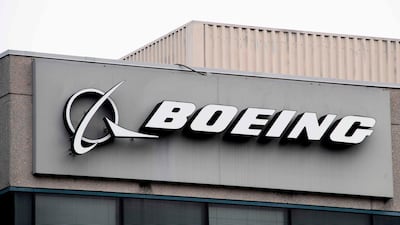Boeing may have to book billions of dollars in additional charges related to its grounded 737 Max jets, brokerages said on Monday, following reports that call into question the timing of the aircraft's return to service.
Credit Suisse and UBS downgraded the stock after reports on Friday showed internal messages between two Boeing employees stating that the plane's anti-stall system behaved erratically during testing before the aircraft entered service.
The new revelations pose fresh challenges for Boeing, which is reeling under pressure after two fatal crashes forced the company to ground the planes and book billions of dollars in losses.
Boeing's shares fell as much as 5.7 per cent to $324.40 (Dh1,176) in early trading on Monday, making the stock the biggest percentage loser on the Dow Jones Industrial Average. They have lost 18 per cent of their value since the second deadly crash of the popular single-aisle jet in March.
The plane maker has already cut production of the Max, and analysts said there was an increasing possibility that the company would have to halt production altogether.
"We see increasing risk that the Federal Aviation Administration won't follow through with a certification flight in November and lift the emergency grounding order in December," UBS analyst Myles Walton said, downgrading the stock to "neutral" from "buy".
Walton cut his target price on Boeing's shares by $95 to $375, citing an increase in "likelihood of a pause on the 737 MAX production system" due to a delay in the jet's return.
UBS also downgraded Boeing's biggest supplier, Spirit AeroSystems, to "neutral" from "buy" and cut its target price on the stock to $88 from $92.
Boeing's shares fell nearly 7 per cent on Friday after Reuters first reported the news, which prompted a demand by US regulators for an immediate explanation and a new call in Congress for the company to shake up its management.
The company on Sunday expressed regret over the messages, and said it was still investigating what they meant.
Credit Suisse, which had stuck to its "outperform" rating since July 2017, downgraded the stock to "neutral" and cut its target price by $93 to $323, 6 per cent below Boeing's Friday closing price of $344.
With the likely delay in Max's return to service until February 2020 and the stoppage of production, the American plane maker could record $3.2 billion in charges over four months on top of a $5.6bn charge taken so far, analyst Robert Spingarn said.
"[Boeing] could be forced to furlough or fire a portion of its Max workforce. This could result in lost labour force productivity when/if the Max does return to service. We have seen the consequences of such events in shipbuilding: it can be ugly," said Spingarn.
Bank of America Merrill Lynch reduced its price target on Boeing's shares to $370 from $400, saying there were many questions swirling around Boeing's culture, brand and corporate governance following the latest developments.
"Risk management, disclosure and accountability of management and the board … could weigh on the stock in the wake of this setback," BofA analyst Ronald Epstein said.

